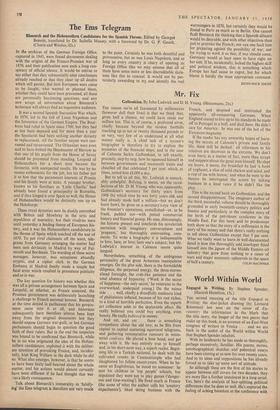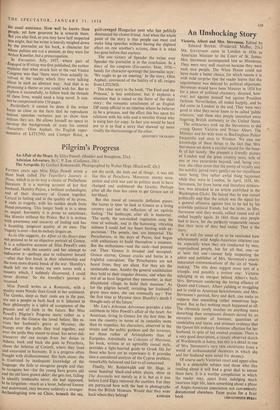World Within World
Engaged in Writing. By Stephen Spender. (Hamish Hamilton, 15s.)
THE second meaning of the title Engaged in Writing; the dust-jacket drawing (by Leonard Rosoman) last seen on the cover of En- counter; the information in the blurb that the title story, the longer of the two pieces that make up this book, is an account of an East-West congress of writers in Venice . . . and we are back in the ambit of the World within World that Stephen Spender inhabits.
With its landmarks he has made us thoroughly, perhaps excessively, familiar. His poems, stories, autobiographical sketches and polemical essays have been coming at us now for over twenty years. And to its ideas and suppositions he has already forced us to take up some sort of attitude.
So although these are the first of his stories to appear between stiff covers for two decades, they are more like a further instalment in a long serial. Yes, here's the analysis of hair-splitting political differences that he does so well. He's captured the feeling of aching boredom at the conference with his usual assurance. How well he knows these people, yet how generous he is towards them. But you also find, as you may have half suspected You might, that the writer is heavily weighed down by the journalist on his back, a character for Whom politics are not a passion, as they were for Arthur Koestler, but a preoccupation.
In Encounter, July, 1957, where part of Engaged in Writing was first published, the author explains that what struck him at the real Venice Congress was that 'there were lives actually in- volved in the reality which they were talking about in such an abstract way.' And that is as promising a theme as you could wish for. But to explore it successfully, to follow back the threads of these lives, would need a long novel. It can- not be compressed into 150 pages.
Particularly it cannot be done if the writer keeps so close to the facts that he reproduces tedious speeches verbatim just to show how tedious they are. He allows himself no space to develop the backgrounds of even his central characters : Olim Asphalt, the English repre- sentative of LITUNO, and Csongor Botor, a guilt-ravaged Hungarian poet who has publicly denounced his closest friend. And when the whole point of the story is that people can meet and make long speeches without having the slightest effect on one another's actions, then it is what has gone before that matters.
The one victory of Spender the writer over Spender the journalist is in the conclusion. In a diary of the congress (Encounter, June, 1956— handy for character-spotting) the journalist says: 'We ought to go on meeting.' In the story, Olim Asphalt, convinced of the futility of it all, resigns from LITUNO.
The other story in the book, 'The Fool and the Princess,' is less ambitious; but it explores a situation that is suited to the form of the short story : the romantic attachment of an English DP camp official to an internee whom he believes to be a princess, and the effect this has upon his relations with his wife and a novelist friend who is using him for copy. In fact you would be hard put to it to find a story that showed up more vividly the shortcomings of the other.
GEOFFREY NICOLSON







































 Previous page
Previous page